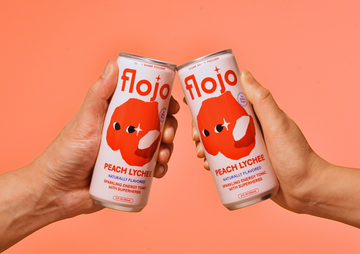By Nikhail Thakker, Dr. Christine Wong, PhD
What is Flojo?
Flojo is Asia’s first productivity drink. This plant-based powerhouse drink is wellness in a can, packed with a formula of 7 organic, brain-boosting botanicals with a sparkling Yerba Mate tea base. With a potent blend of nootropics and adaptogens, Flojo supports your daily energy, focus, and brain health.
When you think energy drinks, what comes to mind are probably those high-sugar, high-caffeine canned beverages packed with artificial additives that have become all too common in fridges across every grocery and convenience store.
Flojo is different. Flojo is a whole new kind of energy drink that’s crafted to boost brain power. Flojo has no added sugar, is low in calories, and has only 18mg of natural caffeine a can, which is just a small fraction (less than a fifth) of the caffeine content you see in an average energy drink. So you may be wondering, without the caffeine spike, how does Flojo boost energy, support productivity, and brain health on top of that?
Let’s start with what caffeine is and what the side effects of high caffeine are (ie also reasons why Flojo is formulated with low levels of natural caffeine only).

PHOTO BY IONELA MAT / UNSPLASH
What is caffeine and why is high caffeine bad for you?
TLDR: Caffeine simply masks your fatigue, and doesn’t actually give you energy directly.
Caffeine is a compound that is naturally occurring (found in tea, coffee, and specific plants and fruits) or synthetic (found in typical energy drinks). It can stimulate the brain, increase your blood pressure and heart rate, and affect your mood. Though in low moderation, there can be positive health benefits of caffeine, overconsumption has unhealthy side effects.
If you thought that drinking caffeine would spike your energy levels for a bit, you’d be right but that’s not the whole story. Caffeine promotes a sense of alertness using negative feedback, shutting off adenosine receptors in your brain that would typically stimulate relaxation and regulate your natural daily circadian rhythms and sleep (1).

PHOTO BY VITALY GARLEV / UNSPLASH
That means caffeine doesn’t actually provide energy in the form of nourishment. Instead caffeine tricks your mind into thinking you’re not tired, when oftentimes, you may actually need the rest and recovery. And sleep and recovery are the elixirs of life, essential for natural healing, promoting our immune system, and allowing our mind-and-body to function at its best.
Drinking that tempting cup of coffee or highly caffeinated drink in hopes of beating that afternoon slump could also cause disrupted sleep and insomnia later at night.

PHOTO BY UNSEEN STUDIO / UNSPLASH
When deadlines loom, highly caffeinated drinks may be all too appealing for an easy fix. But while caffeine can give you a quick spike in energy, the after effects can often be damaging if taken in high doses. Even if you’re constantly fueling with caffeine, a crash is inevitable, bringing on heavy fatigue as a result of your disrupted body clock. Not to mention, high levels of caffeine can also lead to anxiety and panic attacks (2).
Understanding the science behind caffeine, Flojo drinks were expertly formulated to provide a boost of energy and focus without high levels of caffeine.

PHOTO BY FLOJO DRINKS
How does Flojo work without high caffeine?
Immediate effects from Flojo
What sets Flojo apart from your mainstream energy drink is that Flojo doesn't rely on high caffeine levels to give you that productivity boost. Rather, Flojo is formulated with a powerful combination of nootropics and adaptogens and a Yerba Mate tea base. Yerba Mate is a herb originating in Latin America, historically used as a stamina booster.

PHOTO BY GETTY IMAGES / ISTOCKPHOTO
In addition, Flojo’s formula contains B6 and B12 vitamins, which are essential for metabolism and energy production for your mind and body (3). In turn, an increased release of energy will have you feeling revitalized and primed to take on whatever tasks you may have in store, without the effects of a crash later on.

PHOTO BY SIRICHAI ASAWALAPSAKUL / VECTEEZY
Not only does Flojo contain great natural energy boosters, it also packs a variety of nootropics and adaptogens, including Cacao, which can support your concentration. Flavanols found in cacao extract have been shown to regulate blood flow to the brain (4), enhancing cognitive function and in turn boosting your focus and productivity.
Proactive benefits and long-term effects
Another nootropic and adaptogen featured in our formula is Reishi, a prominent mushroom in East Asian traditional remedies. Reishi has been found to boost mood, reduce fatigue (5), and counter symptoms of anxiety (6), to further support a state of ultimate productivity.

PHOTO BY SASIRIN PAMAI / VECTEEZY
Flojo is also crafted with Ginseng, another cornerstone herb of Asian medicine with well-established immunity benefits (7). But did you know that it also has brain-boosting properties? Studies have shown that regular consumption of ginseng over time can heighten your focus and enhance your acute memory, improving your ability to recall finer details (8).
Although adaptogens are mainly useful in reducing stress, they can also do wonders for your immune system. Echinacea, another adaptogen found in Flojo’s plant powered formula, is a well-researched immunity booster. Regular consumption can reduce recovery time from the flu or other such illnesses by days (9). This is just a snapshot of a few of the many beneficial botanicals in Flojo (read more here).





